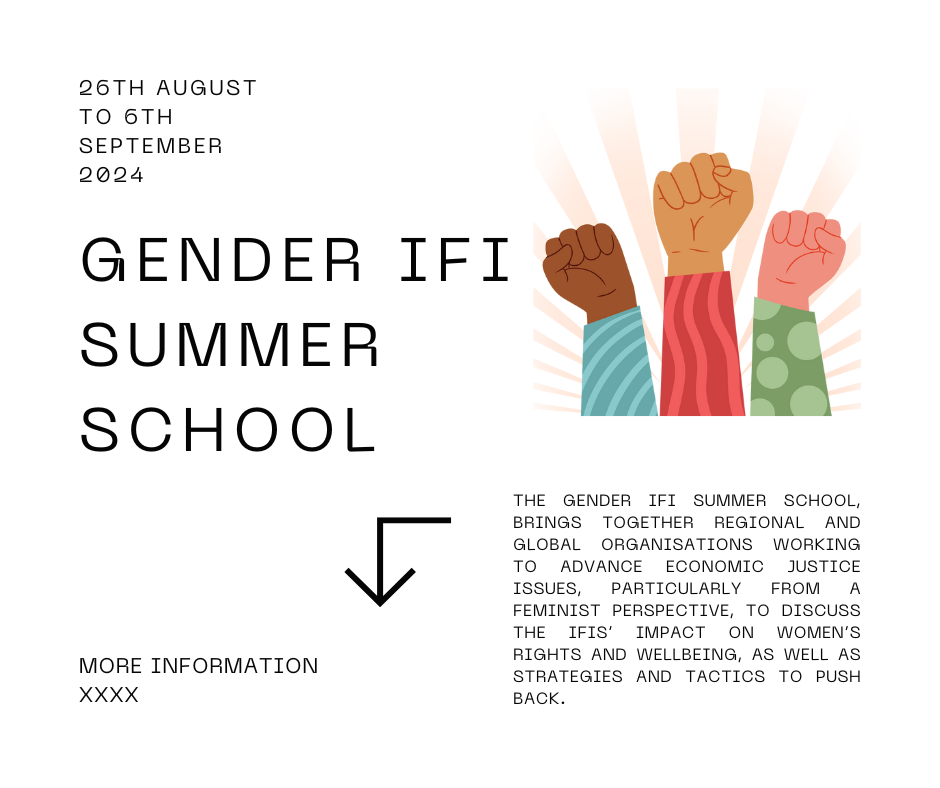Gender IFI Summer School 2024
The Gender International Financial Institutions Summer School, organised by the Gender IFI civil society collective, brings together regional and global organisations working to advance economic justice issues, particularly from a feminist perspective, to discuss the IFI’s impact on women’s rights, as well as strategies and tactics to push back.
This year, the school consisted of 6 online sessions. MENA Fem led Session 5: Beyond the Bottom Line: Moving Past Austerity in the Global South, and supported the development of Session 2: Feminist Approaches to Debt and Women as Workers.
Find out more and watch the sessions below.
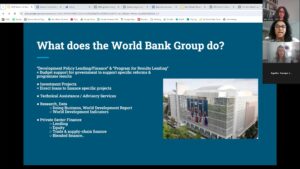 Session 1: World Bank & IMF Gender Advocacy: History, Strategy, Tactics
Session 1: World Bank & IMF Gender Advocacy: History, Strategy, Tactics
An initial informative session exploring how International Financial Institutions (IFIs), primarily the World Bank and IMF, operate and perpetuate gendered harm. A historical review of the role of IFIs through the past several decades will be offered, highlighting how the colonial vision of ‘development’, through structural adjustment and its modern iterations, continues to keep global majority countries from adequately meeting their populations’ needs; especially women, girls and sexual and gender minorities. Panellists will highlight the gendered impacts of macroeconomic policies promoted by the institutions, examining their impacts on women in different regions of the world.
Speakers: IBON International, Centre for Global Development, ActionAid UK, Christian Aid.
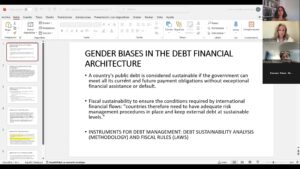 Session 2: Feminist Approaches to Debt and Women as Workers
Session 2: Feminist Approaches to Debt and Women as Workers
Debt is an increasingly pervasive burden for countries across the globe, within which the IFIs are heavily intertwined and influential. Reflecting on recent work linking the topic of debt to feminism, panellists will explore how the IFIs affect the global debt situation. The session will have a special focus on women as workers and the impact debt levels have on them, offering regional case studies from a Pan-African perspective. Others will explore alternatives to debt, including life sustainability over debt.
Speakers: MENAfem, Eurodad, Latindadd, International Trade Union Confederation.
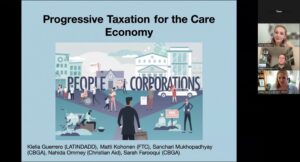 Session 3: Progressive Taxation for the Care Economy
Session 3: Progressive Taxation for the Care Economy
A session exploring the importance of progressive taxation in relation to the care economy. Following an introduction to care (defining paid and unpaid, domestic and formal, types of care, and the enormous role it plays in supporting economies whilst being largely unvalued), presenters will explore the importance of progressive taxation based on their respective workstreams. Recent findings from the Financial Transparency Coalition will be shared. Deeper dives into the vital role of governments and how this is undermined by institutions including the World Bank and IMF will be offered by presenters, with case studies including a Latin American perspective.
Speakers from: ActionAid UK & Young Urban Women, Financial Transparency Coalition, Latindadd, Christian Aid.
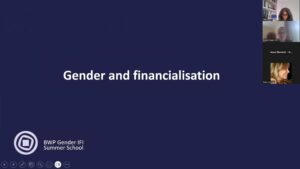 Session 4: Gender and Financialisation
Session 4: Gender and Financialisation
Financialisation has reconfigured international development space in much the same way as it has reconfigured the global economy to work in the interests of international finance. Finance has become an engine for the extraction of value from the real economy (the non-financial sectors of the economy). Private capital has been recast as a key development actor, essential to plug the supposed funding gap caused by inadequate domestic revenue mobilisation and international aid to finance the development of the Global South. This session will provide an overview of the gendered impacts of the financialisation on development, with a focus on the privatisation of public services and the effects of reconfiguring Global South economies to facilitate profit extraction.
Speakers from: University of Rio de Janeiro & SOAS, Gender Action, FEMNET, Oxfam.
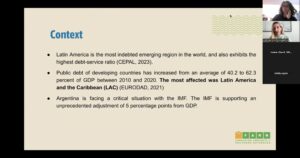 Session 5: Beyond the Bottom Line: Moving Past Austerity in the Global South
Session 5: Beyond the Bottom Line: Moving Past Austerity in the Global South
This session challenges the traditional economic framework focused on GDP (Gross Domestic Product) and explores the impact of austerity measures on the working class, women, and the environment in Global South countries. This session will provide a critical perspective on the creation of the World Bank and International Monetary Fund (IMF), highlighting their historical role in promoting austerity policies in the Global South. It will delve into the mechanisms of SAPs, using real-world case studies from the MENA, Latin America, and Africa to illustrate their effects. It will also explore the inflationary consequences of austerity measures, analyzing how they disproportionately impact marginalized communities, particularly women. We’ll tackle how austerity policies lead to cuts in social programs like healthcare and education, hindering progress towards gender equality and environmental sustainability. We will also discuss how austerity measures exacerbate existing inequalities, disproportionately affecting women’s access to resources and environmental well-being. The session will highlight inspiring examples of movements in Kenya and Argentina who have mobilized against austerity and advocated for alternative economic models. We will conclude by exploring concepts like the well-being economy and feminist economic alternatives. We’ll also discuss successful grassroots initiatives in the Global South that operate outside traditional frameworks.
Speakers from: CEWLA, FEMNET, FARN, MENAFem.
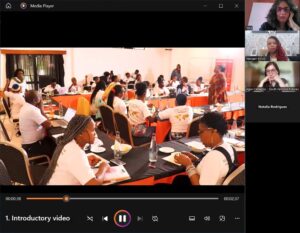 Session 6: Imagining Feminist and Decolonial Development (Strategising)
Session 6: Imagining Feminist and Decolonial Development (Strategising)
A forward-looking space for sharing feminist and decolonial hopes for the future. What does feminist development look like? Where do we see interesting efforts at disrupting the current development finance model? How can we bring about this vision? Let’s strategise and share hopeful examples of solidarity and ongoing feminist initiatives. Panellists will share their perspectives and offer examples of feminist alternatives.
Speakers from: International Trade Union Confederation, DAWN, ActionAid UK.


